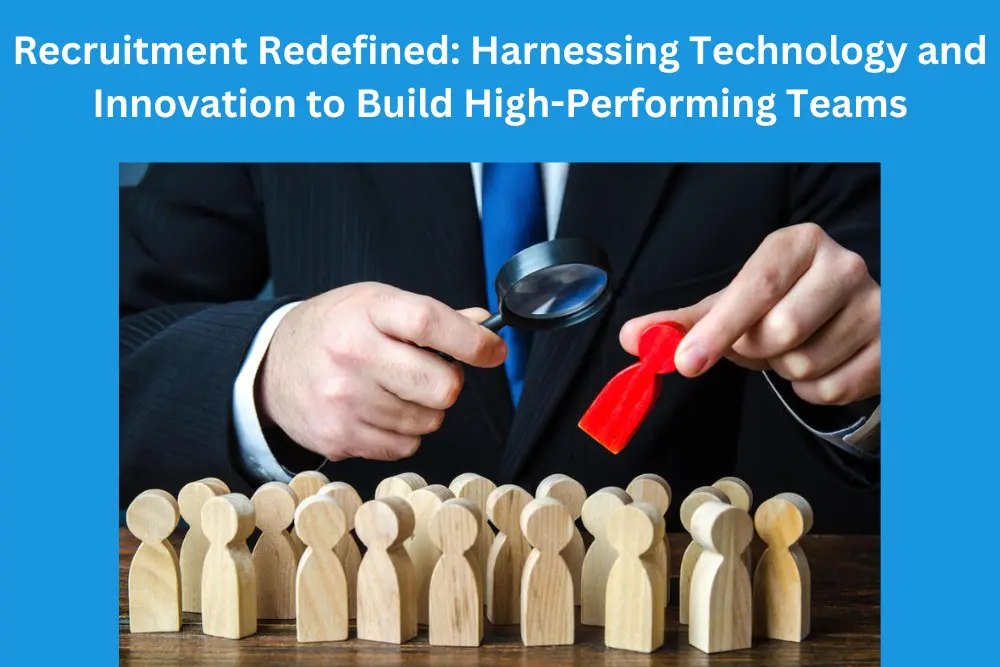In the fast-paced and competitive landscape of modern business, the quest for top talent remains a priority for organizations striving to stay ahead of the curve. Traditional recruitment methods, while effective in their time, are being reshaped by the advent of technology and innovation. From AI-powered recruitment software to sophisticated interviewing platforms, organizations are redefining the recruitment process to build high-performing teams capable of driving success in today’s dynamic environment. In this blog, we explore how technology and innovation are revolutionizing recruitment, from sourcing candidates to onboarding and the impact they have on organizational performance.
Embracing Recruitment Technology:
Recruitment has evolved from manual processes to sophisticated systems powered by technology. Recruiting software, such as Applicant Tracking Systems (ATS) and Recruitment Management Systems (RMS), streamline the entire recruitment process, from job posting to candidate onboarding. These platforms automate repetitive tasks, track candidate progress and provide valuable insights into recruitment metrics, enabling recruiters to make data-driven decisions and optimize their hiring strategies.
The Rise of AI in Recruitment:
Artificial Intelligence (AI) has emerged as a game-changer in recruitment, revolutionizing the way organizations identify, assess and hire talent. AI recruitment software leverages machine learning algorithms to analyze resumes, screen candidates, and predict job fit based on historical data. By automating tedious tasks and minimizing human bias, AI enables recruiters to focus their time and energy on engaging with top-tier candidates and nurturing talent pipelines.

Interviewing Platforms:
Interviewing platforms have transformed the way organizations conduct interviews, offering virtual solutions that transcend geographical barriers and streamline the interview process. These platforms facilitate video interviews, real-time collaboration, and candidate evaluation tools, providing recruiters with a comprehensive view of candidates’ skills and competencies. Additionally, interviewing platforms integrate seamlessly with ATS and RMS, ensuring a seamless transition from candidate sourcing to evaluation and selection.

Recruitment Redefined:
The traditional recruitment process, characterized by manual workflows and subjective decision-making is being redefined by technology and innovation. Recruitment is no longer limited to posting job ads and reviewing resumes; it’s about building relationships, engaging with candidates and creating exceptional candidate experiences. By harnessing the power of recruitment technology, organizations can attract top talent, streamline their hiring processes and build high-performing teams capable of driving organizational success.
Steps for Recruitment Process Optimization:
- Define Recruitment Objectives: Clearly define recruitment goals and objectives, aligning them with the organization’s strategic priorities and business needs.
- Utilize Recruitment Software: Invest in recruitment software such as ATS and RMS to automate repetitive tasks, streamline workflows, and gain valuable insights into recruitment metrics.
- Embrace AI Recruitment: Leverage AI-powered recruitment software to screen candidates, predict job fit, and minimize bias in the hiring process.
- Implement Interviewing Platforms: Adopt interviewing platforms that facilitate virtual interviews, real-time collaboration, and candidate evaluation, enhancing the efficiency and effectiveness of the interview process.
- Continuous Improvement: Regularly review and refine recruitment processes based on feedback, data analytics, and emerging trends in recruitment technology.

Recruitment Tracking and Analytics:
Recruitment tracking and analytics provide organizations with valuable insights into recruitment performance, candidate quality, and time-to-hire metrics. By tracking key performance indicators (KPIs) such as cost per hire, time to fill and candidate satisfaction, organizations can identify areas for improvement and optimize their recruitment strategies accordingly.
Pioneering the Future of Talent Acquisition
Recruitment is undergoing a transformation, driven by technology and innovation. Organizations that embrace recruitment technology, harness the power of AI and optimize their recruitment processes will gain a competitive advantage in attracting, engaging, and hiring top talent. By redefining recruitment, organizations can build high-performing teams capable of driving success in today’s dynamic business landscape.










